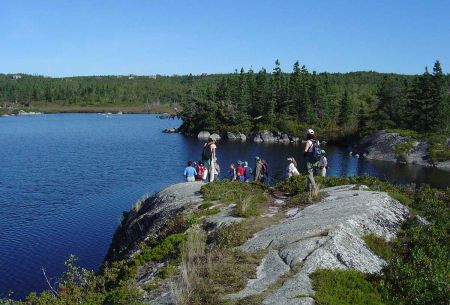K'JIPUKTUK (Halifax) - A group of large-parcel landowners along Purcell's Cove Road have asked for a change in the Regional Plan to allow for development of their properties.
The largest of the properties in question is a 394-acre parcel partially surrounding Williams Lake, a popular hiking and swimming spot, and stretching back to completely surround Colpitts Lake. This parcel is owned by Clayton Developments, who purchased it in 2011.
Currently, much of the Purcell's Cove backlands can't be developed. The area was designated Urban Reserve under the 2006 Regional Plan, meaning it is to be kept free for higher density urban development at some point in the future, outside the life of the 25-year plan.
In a letter submitted to regional council by Councillor Stephen Adams, a lawyer representing the owners asked HRM to revert the lands to their pre-2006 designations and zoning.
The request will be considered for first reading by Regional Council this Tuesday, February 25th, along with a host of revisions to the Regional Plan that have come out of the RP+5 process.
City planning staff have recommended against granting the current request for plan changes for the backlands, citing a host of concerns from traffic and environmental considerations, to maintaining a potential supply of land for future urban development.
A group of citizens known as the Purcell’s Cove Residents Action Committee has voiced their opposition to the designation and zoning change. The Committee first coalesced in response to a sewer and water feasibility study for Purcell's Cove Road commissioned by HRM in February 2011. Citizens saw the study as a move to open up the backlands to dense, serviced development. In March 2013, the committee overseeing the controversial study disbanded before tabling what was poised to be a negative recommendation on extending sewer and water.
Kathleen Hall is a local resident and member of the Williams Lake Conservation Company, who have been stewarding the lake since they formed in 1968. "We're very upset for a number of reasons," says Hall. "We all participated in a [the RP+5] process, and we trusted the process. These developers are trying to sideswipe the whole process by having this last minute request put in."
In the letter before council, the landowners' lawyer makes the case that, "the failed process [of the sewer and water feasibility study] has left their landholdings in a state where only one home can be built on a property regardless of its size." The zoning of the lands remains unchanged since 2006, before the sewer study was initiated. And for the major landholder, Clayton Developments, the zoning of their land is the same as when they bought three years ago.
It appears that either Clayton Developments bought the Williams Lake lands in 2011 thinking they would be able to change the designation and zoning, or else they didn't fully realize the implications of the existing regulations. In a meeting with executive members of the Williams Lake Conservation Company in June 2012, Clayton Development's Mike Hanusiak said that even if the land couldn't be serviced with sewer and water, the company still intended to develop with on site septic and water. However, then as now, the designation and zoning did not allow for the subdivision necessary to develop the land at all.
"The developers are saying they're going to lose money," says Kathleen Hall. "Well, they took the risk. Lots of us bought Nortel and we know what happened there."
Before 2006, the plan for the backlands had a similar long term goal, but much looser rules. The backlands were designated a Residential Development District on the future land use map (that is, meant for high density, mixed use, centrally planned development.) And they were zoned Holding, a temporary zone until municipal services would become available to support development.
But it turns out a Holding zone can't hold much. It actually allows what's commonly referred to as "as of right" development, where landowners can subdivide their land into parcels and build homes with on site water and septic. This type of development, though permitted under the former Holding zone, would have thwarted the purpose of the former land use designation, Residential Development District.
So it seems like the 2006 Regional Plan simply changed the rules to match the long term strategy that had already been in place.
"It was foreseen that it would eventually be urban," says Kathleen Hall, "but I think that as we understand climate change, the need for forests close to a city, how people have to get out and excercize, and the value of nature, I think we're seeing a shift. Maybe when the year 2031 rolls around we won't want this developed."
Hall's group, the Williams Lake Conservation Company, recently completed a flora study of the backlands and conducts regular water testing in Williams Lake. The WLCC is joining a Backlands Coalition along with other non-governmental organizations interested in preserving the natural state of the backlands for common use.
The landowners have a different vision. Their letter to council states the group will not "sit back and allow RP+5 to further entrench their lands in a state of planning purgatory so that the general public can continue to treat private property as public parkland."
There's a certain irony to the decision before Regional Council. Groups interested in preserving natural habitat are in the position of cheering for zoning that calls for higher density development, albeit 15-20 years in the future. And the would-be developers of the backlands are in the position of arguing for the right to build less densely, just so they get the chance to develop at all.
Council next meets on Tuesday, February 25th starting at 10am. It's expected they will give first reading and schedule a public hearing for the amended Regional Plan, as well as the Purcell's Cove backlands request.
See also: News Release: Purcell's Cove residents urge Council to reject developers' last minute RP+5 request to rezone the Backlands




